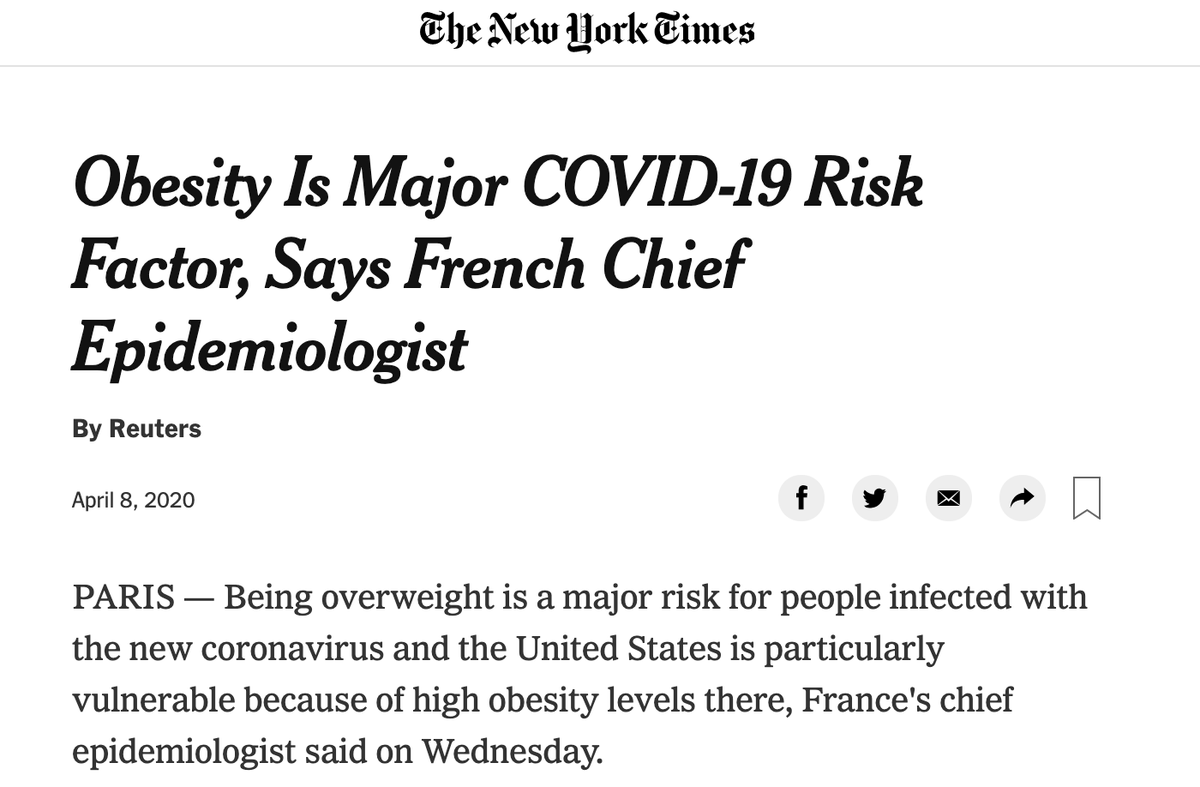We talk about risk factors all the time. Not just in the medical scientific literature: you will find risk factors being discussed in the popular media and on social media too
Exhibit A: https://www.nytimes.com/reuters/2020/04/08/world/europe/08reuters-health-coronavirus-france-confinement.html?searchResultPosition=2
2/n">https://www.nytimes.com/reuters/2...
Exhibit A: https://www.nytimes.com/reuters/2020/04/08/world/europe/08reuters-health-coronavirus-france-confinement.html?searchResultPosition=2
2/n">https://www.nytimes.com/reuters/2...
The term "risk factor" is popular in medical research. It has been used in literature since at least the 1950s
BUT definitions for what a risk factor really is or should be varies. As this article argues quite convincingly https://www.bmj.com/content/355/bmj.i6536.full
3/n">https://www.bmj.com/content/3...
BUT definitions for what a risk factor really is or should be varies. As this article argues quite convincingly https://www.bmj.com/content/355/bmj.i6536.full
3/n">https://www.bmj.com/content/3...
That brings us to the first problem: an important "risk factor" for, say, a bad outcome (death, for instance) after COVID-19 diagnosis can make good TV AND be completely meaningless for doctors and patients
4/n
4/n
It depends on what the risk factor represents
Is it a factor that when changed immediately changes the risk of a bad outcome?
Is it a factor that we should keep in mind when making prognosis?
Or is it a factor that simply covaries with other "known risk factors"?
5/n
Is it a factor that when changed immediately changes the risk of a bad outcome?
Is it a factor that we should keep in mind when making prognosis?
Or is it a factor that simply covaries with other "known risk factors"?
5/n
Sounds simple enough?
Well, take this example: https://academic.oup.com/cid/advance-article/doi/10.1093/cid/ciaa415/5818333
Conclusion:">https://academic.oup.com/cid/advan... "Unfortunately, obesity in people <60 years is
a newly identified epidemiologic risk factor which may contribute to increased morbidity rates ..."
6/n
Well, take this example: https://academic.oup.com/cid/advance-article/doi/10.1093/cid/ciaa415/5818333
Conclusion:">https://academic.oup.com/cid/advan... "Unfortunately, obesity in people <60 years is
a newly identified epidemiologic risk factor which may contribute to increased morbidity rates ..."
6/n
Should people with overweight start losing weight quickly to avoid COVID-19 related morbidity?
Or are we looking at a complex relationship between access to care, history of diseases, social economic status and a bad outcome?
And why below 60 you ask, and not, say, 53?
7/n
Or are we looking at a complex relationship between access to care, history of diseases, social economic status and a bad outcome?
And why below 60 you ask, and not, say, 53?
7/n
That brings us to the second, related issue: there are no rules in the find-a-risk-factor game
8/n
8/n
Take the example above, the researchers decided to take 60 years as the cut-off for a "young" versus "old" people analysis. Why? Who knows!
And why were people with a BMI of 35 and over compared only to people with a BMI in the 30-34 range?
There. Are. No. Rules
9/n
And why were people with a BMI of 35 and over compared only to people with a BMI in the 30-34 range?
There. Are. No. Rules
9/n
With COVID-19, finding risk factors and high risk groups clearly isn& #39;t just an academic exercise
If we aren& #39;t careful, COVID-19 patients will suffer from arbitrary risk grouping, statistical malpractices and/or hidden health(care) inequalities
10/n
If we aren& #39;t careful, COVID-19 patients will suffer from arbitrary risk grouping, statistical malpractices and/or hidden health(care) inequalities
10/n
This thread is not just to complain (okay, maybe a little)
We can do and should do better. To start, by defining what it is we are after when we study these dangerously ambiguous "risk factors"
11/n
We can do and should do better. To start, by defining what it is we are after when we study these dangerously ambiguous "risk factors"
11/n
Many will already be familiar with the often helpful distinction between prediction, explanation (or counter-factual prediction) and description
Those who are not, this is a great place to start: https://www.stat.berkeley.edu/~aldous/157/Papers/shmueli.pdf
12/n">https://www.stat.berkeley.edu/~aldous/1...
Those who are not, this is a great place to start: https://www.stat.berkeley.edu/~aldous/157/Papers/shmueli.pdf
12/n">https://www.stat.berkeley.edu/~aldous/1...
And there is a place for each, IMHO:
It is helpful to identify strong predictive factors that help with diagnosis and prognosis
It is helpful to identify the true causes of bad outcomes after infection
It is helpful to describe which patients ended up in ICU
13/n
It is helpful to identify strong predictive factors that help with diagnosis and prognosis
It is helpful to identify the true causes of bad outcomes after infection
It is helpful to describe which patients ended up in ICU
13/n
This was just to say: finding risk factors is a risky business if we are not specific our aims and methods
end rant.
end rant.
Apparently this thread could have been summarized in just one tweet https://twitter.com/statsepi/status/1249680569463721984?s=21">https://twitter.com/statsepi/... https://twitter.com/statsepi/status/1249680569463721984">https://twitter.com/statsepi/...

 Read on Twitter
Read on Twitter


